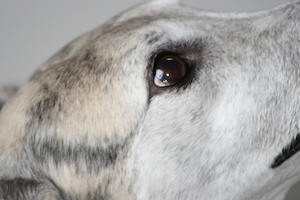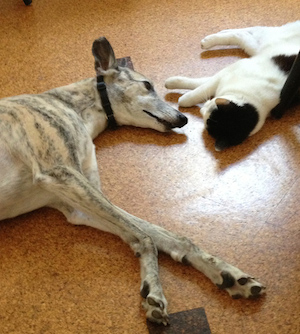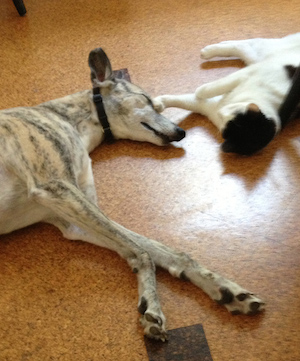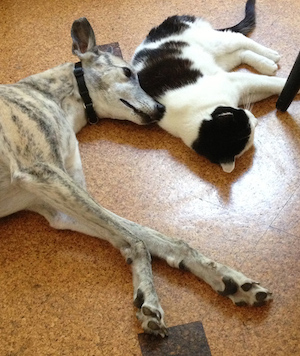Dog Stays in the Picture (13 page)
Read Dog Stays in the Picture Online
Authors: Susan; Morse
Sam arrived last week (he has a beard!) followed by Eliza. A college-aged nephew flew in yesterday and David's mother is here too. Ben and David landed this morning, as did David's sister and her husband, all with different airport pickup times. Lilly does not recognize anybody and keeps hiding behind my legs
(They're very tall. They won't stop touching
you)
and the dishwasher is threatening to die. Truly, I would not have it any other way. I am
very happy
,
but I wish they'd all stop asking what time the next meal is.
Once everyone is sufficiently stuffed with turkey and pie and Mother Brigid is snoring over her prayer book in the living room, I grab Lilly's leash so we can clear our heads for a second.
We've stepped up the walks lately, mostly on advice from a canine separation-anxiety specialist, Wendy. I showed Lilly's videos to Wendy and pointed out our chewed-up kitchen door, hopeful that this woman with a reputation for magically transforming troubled dogs would sort us out. Her solution? Plenty of exercise, supplemented by drugs. Apparently nothing else will work for a dog this age. Lilly's too set in her ways, and separation anxiety is practically guaranteed to escalate dangerously if you don't squelch it quickly. Dogs have been known to destroy everything handy when they're left home aloneâthey will chew up an entire sofa, eat into walls and insulation, even crash through a plate-glass window to get outside so they can track down missing owners.
The desk in the mudroom is right in front of a huge window. I am positive Lilly jumps up there when I'm gone because she wants to see outside better. What if she decides to smash through the window? I've heard of dogs dying that way. This is not just about keeping the dog from damaging the house; it's about keeping the house from damaging the dog.
I was horrified at the notion of zonking Lilly out, and it took quite a while for Wendy to convince me to try medication. I'm not a drug person, but given my anxiety on airplanes, I do understand that meds can be useful as long as they're not overused. We'd been trying holistic solutions, lunging at anything anybody suggested: spiking her water dish with Rescue Remedy, spraying an atomizer of canine pheromones just before going out, even propping a large stuffed Toys“R”Us dog next to Lilly's favorite bed along with a pair of my dirty socks. Nothing was working. I kind of think that stuffed dog made Lilly even more freaked out than she already was. We're out of alternatives.
Once Wendy assured me we'd be using a very low dose and it could be stopped anytime, I decided it was worth a test run. Along with the medication and extra walks, Wendy says training exercises are a must. Like children, dogs need structure and a sense of purpose. I'm now armed with all kinds of fabulous treats. Freeze-dried liver and duck strips provide heaps more incentive than your average Milk Bone. It's kind of a game and amazing how much more willing Lilly is to process simple hand signals when you've got the right motivation.
(She holds her hand up and looks at you, and if you lie straight down, it's DELICIOUS.)

As always, everything has to be slightly tailored greyhound-wise. I have to keep training sessions cheerful and short or Lilly will collapse under all the scrutinyâher clinginess sort of evaporates and she abandons me, scramming out of the room. I'm not sure if it's genetic or a result of the confined kennel lifestyle where certain skills were not a priority, but the greyhounds I know are not likely to “come” on command. They'll learn it, sort of, but not in any reliable way. Linda says on the rare occasions Dylan and King accidentally slip out the gate, calling them back is pointless. The best thing to do is simply run in the complete opposite direction, really fast, because they will chase her to see whatever exciting thing she's found. (This should work for Lilly. She won't let me out of her sight.)
I've embraced Wendy's reward-based training method, which is popular with many dog behaviorists these days. Like with kids, it's all about positive reinforcement: “capturing” the expected good behavior (almost like taking a photograph when Lilly does what you want) and instantly celebrating it with treats. This is much more fun than having to pounce on bad behavior. Most trainers agree that no matter what, a regular obedience routine will keep Lilly out of what Wendy calls the fight-or-flight “Lizard Brain” and put her more in the thinking “Wizard” mode, which helps keep her anxiety at bay. The drugs are only there to take the edge off.
It's been about two weeks since we started the Prozac and so far she's the same dogâstill freaked out in the home-alone videos, unfortunately. Wendy tells me to give Lilly more time, and stick to that steady exercise regimen, which is not a bad thing. Our neighborhood is great for walking, and lately my favorite route has been around the corner to check on the chickens.
My friend Rose has a sort of urban farm situation: organic vegetables, honeybees, and about half a dozen hens scratching around in the shrubbery. They sleep in this fabulous fox-proof henhouse, cleverly designed with special doors above the nesting loft so you can easily reach in and scoop out eggs. Rose had to banish their rooster to the country because he was too obstreperous, crowing imperiously long before sunrise and bullying her dogs.
Without a rooster's active participation, the hens' eggs are no longer good for anything but breakfast. Rose's chickens don't seem to particularly mind missing out on the chance to reproduce, but Rose doesâshe'd been counting on a few chicks every now and then. So occasionally she orders pre-fertilized eggs online, pops them into a nest (she marks them first so she can tell them apart from the eggs her chickens lay themselves), and watches to see if any of the ladies will take to them.
Apparently not all hens feel the “broody” instinct to sit on eggs, so Rose keeps a few extras warm on her kitchen counter, in little electric egg-carton-type incubators with clear plastic lids so the family can watch them hatch up close. Next, the big challenge is to get a couple of the hens to accept them. Rose says it's a little nerve-wracking to open the henhouse trapdoor, choose a random nest, slip a handful of featherless, limp little foundlings in, and leave them there, fingers crossed, hoping they'll connect with a mother and survive the night.
I find the whole situation fascinating, and I'm kicking myself I didn't think of raising chicks when our kids were little. I may have been too preoccupied and controlling to risk taking on litters of kittens and puppies like my mother, but chicken breeding was so doable. This missed-opportunity sensation keeps coming up latelyâI've been dwelling on imagined parenting mistakes: Sam would never have had his football injury if I'd followed my instincts and forbade the sport in the first place. Ben wanted to switch schools in sixth grade, and then changed his mind. I'll always wonder what it would have been like for him if we'd made that happen, and what about Elizaâwas she really asleep under all that earthquake rubble or did she wake up before David got to her? It's alarming to think we've done all we can for our children and now they're almost on their own; I keep wanting to turn back the clock for a do-over so we can make things a little more perfect.
Rose's hens don't really like us. Lilly's chin is quiveringâit's a thing she does when there's something potentially tasty nearby, like cheese, or, apparently, chickens.
(They stretch their necks at you and say
Praaaawk. Puk-puk-pukaaawk.
You could catch them, but you don't think she wants you to.)
Good thing we use a leash, because the ladies are out on their own today, hunting bugs in the bushes. No chicksâit's off-season. On the way home we pick up the pace a little; I'd love to sneak upstairs for a quick lie-down before it's time to think about dinner. I'm really not used to all this activity. I must be getting oldâmy knees don't seem happy.
After a nap, I'm still pretty stiff, and it's worse the next morning: Ma's eighty-ninth birthday. We take everyone out for lunch (a relief; no dishes) and present Ma with the dream gift she's been hinting about all yearâan iPad. She's still yearning to be connected with the priests and out-of-town family by e-mail, and she has a hunch she'll be able to manage this thing better than the computer we tried years ago. By the time I go over iPad basics, drive her home, and carry all the birthday loot up to her apartment, my knees are not cooperating. They don't seem to want to bend. It's getting harder and harder to pick up my feetâI have to slide along in an awkward sort of shuffle. Tomorrow I may have to ask the kids to walk Lilly, which won't work out very wellâthey tend to give up when she freezes, paws clamped to the pavement halfway up the block.
I think I need a doctor. This is not like me.
Why do mysterious, worrisome health mysteries always seem to happen at the end of the business day on a Friday?
Actually, why do I even bother to ask that question? It's so obvious. Score one for the SB frigging Ds.
10.
Anatidaephobia
Anatidaephobia:
The fear that somewhere, somehow,
a duck is watching you.
â
Gary Larson
DECEMBER 2010
A
n early memory:
I am three years old, perched, with my mother, high on the bank of the Wissahickon on a hot summer day. We are watching people feed ducks in the water below us, and I'm hoping there are no worms in the moist earth under my fanny. My dress is very short and we don't have a picnic blanket.
Just as I take the first bite of a slightly soggy bologna sandwich, a disturbance erupts down on the opposite side of the creek: an agitated duck. Could be my imagination, but the duck seems to be coming toward us, and the duck is pissed, thundering relentlessly across the creek, quacking incessantly, louder and louder. When the creature hits land below, the three-year-old me sees it as enormous. I look anxiously to Ma for direction, expecting at any moment we'll be gathering milk cartons and napkins to make a dash for it.
I recall this vividly. Just as the duck's physical mass is distorted in the context of my own size, the speed at which it advances up the bank, in my memory, is perceived in cinematic termsâlike a chase scene in one of those creature movies from the '50s where the camera cuts back and forth between a lumbering giant spider and its prey. You're sure the panicked heroine will be able to outrun the beast if she can just stop screaming and get a move on. In my memory Ma and I are suspended, watching in bewilderment as this monster duck beats a path in our direction, neck stretched, wings flapping. In the seconds before contact I think,
It's a white duckâwhite ducks don't bite, right?
Then
OUCH!
âthe savage creature's beak connects with my tender, exposed haunch.
My innocence was lost that day, along with my bologna sandwich, which, apparently, is what the duck was after. Ever since, I've been particularly cautious around waterfowl, making tonight a challenge: Eliza and I are watching
Black Swan.
David is an Academy voter, and every fall the studios mail him DVDs of current Oscar contenders. They are supposed to be strictly for his consumption, but given I'm not in any shape to go out to the movies I feel no guilt screening this one before he comes home for Christmas. There has been zero improvement on the knee frontâthe doctor at the emergency room was stumped, along with my GP. They've tested me for the scary stuff and can find no sign of anything wrong, which does not necessarily mean much, according to Colette, who is my go-to person whenever there's a health mystery afoot.
Colette reads medical journals for kicks. She keeps a whole collection of reference material on a shelf in her kitchen, where ordinary people store their cookbooks. She has her reasons. Colette's been suffering for decades from an evolving assortment of suspicious ailments, some quite debilitating. Now semiretired (partly because she's not strong enough to work as hard as she once did) she's determined to get to the bottom of things, steadily becoming an expert at navigating the British National Health System, which is no small achievement. Colette is five years older than I am, and with her health complications, she has the edge when it comes to understanding what can happen to women of our certain age. If she has no direct experience with a given problem, there's always someone in her circle who does. (Her mother-in-law; her hairdresser; her husband, Badger; a neighbor's cat.)
When Ma went through her recent two-year health crisis, Colette was an excellent resource; even if she doesn't know something, she'll research like a pro. No matter what disease I toss at her, Colette can be counted on to become an armchair Dr. House overnight, launching into a long-winded analysis of the situation. Sometimes I lose the thread when she's on a roll, partly because there's too much to take in, and partly out of sheer terror.
âAutoimmune conditions run in our family, Sizzle.
âWhat's an autoimmune condition?
âRemember Ma's thyroid and Cousin Buckety's diabetes? I'm still feeling my way here, but it's mwah bwah bmah buddly fuddle FIBROMYALGIA splunk. And sometimes it's POLYNEUROPATHY gabba gabba MULTIPLE SCLEROSIS jinglehopper bindy darp, because it could be POLYMYALGIA RHEUMATICA or
Myalgic Encephalomyelitis
or simply ADULT ONSET DIABETES gumble stumpy-bump.
âWait, what did you say? Is that serious?
âNever mind, Sizzle. I'm sure it's nothing. Just remember to tell the doctor you are HYPERMOBILE, and you had ERITHROBLASTOSIS when you were an infant, and blap smap MIGHT END UP IN A WHEELCHAIR spap girrap.
âSlow down a second, I'm looking for a penâow.
The knee thing has spread to one wrist. Trapped on the sofa that first week, feeling completely unproductive, I decided to redo our Rolodex so our house sitter, Gaillard, can easily find plumbers and whatnot while I'm in New Orleans. That job ended up taking a couple of hours, and next morning, after easing myself gingerly out of bed and creaking downstairs to the kitchen for breakfast, one painful step at a time, the simple act of using my writing hand to lift a container of milk from the fridge made me scream.
I'm beginning to understand this is definitely not an ordinary injury. This thing is colonizing itself, attacking any other part of my body that's under the slightest strain. I'm praying it's temporary, but I have a horrible feeling I'm dealing with something serious and degenerative. It started so abruptly, it keeps getting worse, and the doctors are ominously quiet. Colette says it can take years of testing to identify and effectively treat some of the more complex autoimmune conditions like rheumatoid arthritis and lupus. People get gradually worse and worse, waiting for answers, and often a diagnosis does lead to wheelchairs and skilled nursing rather than a satisfactory cure.
I am not going to think about wheelchairs. â¦
A lot of friends are telling me it could be Lyme disease, even though I have no recollection of ticks on my body, ever, and two blood tests have come up negative for Lyme. I got a call the other day from the daughter-in-law of a friend of Ma's, a middle-aged woman in Maryland named Margot. Margot has been through a long ordeal with what she believes is a low-lying, chronic form of the disease.
âYou have to find the right doctor. I went undiagnosed for three years until I found a specialist who did a different kind of test and put me on IV antibiotics. I'd send you to my person but I think she lost her license. Just get your hands on doxycycline.
âThanks, but my doctor says I should waitâ
âWell, he's wrong! You can't wait! It goes to your brain next! I started losing my mind; I was getting lost going home from the market. Tell your GP to give you doxycycline, and if you feel better after three days I guarantee that's what's wrong with you.
It's bad enough having to hobble around like the thousand-year-old man, calculating every move I make so as not to waste what little energy I can muster, my trip to New Orleans next month hanging in the balance. Losing my marbles would be the last straw; I kind of need them this year. My first book has recently found a publisher and the editing phase will be starting shortly. This is the one positive thing I'm holding on toâmy body may be going rapidly down the tubes, but the novelty of professional purpose is helping fend off despair, like a gift.
Am
I losing my marbles? Either this Margot person is my salvation or a crackpot. Maybe she's both. Either way, what's to lose? A few days ago I called up Dr. Maxwell's office and wheedled enough doxycycline out of him for a week.
Maybe
Black Swan
will distract me
.
All we know is it's Natalie Portman playing a young ballerina who goes crazy under pressure when she's cast as the lead in
Swan Lake.
I love that balletâI saw Nureyev play the prince at Lincoln Center as a teenager and never got over it.
Swan Lake
is a classic, about an innocent, virginal girl enchanted by an evil sorcerer. Odette is a swan by day and a girl by night, and the only way the spell can be broken is if some man declares his undying love to her. The catch is the man has to remain faithful. If he cheats, she'll be a swan forever.
One evening, a prince out hunting by the lake spots Odette and invites her to a ball. But the evil sorcerer sends his witchy daughter Odile in disguise instead, dressed just like Odette but in black. (The same dancer plays both parts. Odile is the real challenge. There's this killer “Coda” during her big seduction of the prince, where Odile has to do thirty-two consecutive fouettésâturns
en pointe
with a whiplash kick in between. Not many ballerinas can handle the Coda.) Things end badly when the prince swears undying love to the imposter Odile, and Odette decides to drown herself in the lake.
I read an interview with Darren Aronofsky, the director of the movie. Apparently
Black Swan
is a kind of werewolf story, except instead of a wolf-man, Natalie Portman's ballerina is a modern-day swan-girl. This sounds perfect for a girls' night with ElizaâI love a good dance movie, and a creepy one like this should be a welcome diversion.
Famous last words.
Lilly settles into her bed in a corner of the TV room, keeping a wary eye out for Joey. He's figured out he's stuck with her, and I think he's decided to attempt a sort of truce/friendship by testing Lilly's boundaries, always creeping in to settle near where she's resting.



The deeper we go into this movie the more vulnerable I feelâit's like the director is out to get me, hitting all my tender spots. There's a ton of mother-daughter stuff: Portman's mother is played by Barbara Hershey, a wonderful actress we don't get to see much of now that she's older. She's playing Erica, who, like me, gave up her own career (dance, in this case) to raise a child. Now Erica's the stage mother from hell. All these festering self-doubts about my own parenting mistakes come roaring to the surfaceâhow is Eliza taking this? I know I wasn't as awful as Barbara Hershey, but still, the whole setup is getting under my skin.
And the body horror! At first it's subtle (close-ups on Nina's feet, flexing till they crackle before she gets out of bed in the morning) but it's so close to homeâevery morning since my symptoms began I lie in bed, testing each joint gingerly before I pull myself upright and gimp awkwardly into the bathroom. Portman's Nina (a painfully shy, stunted twentysomething woman-child with a bedroom full of pink satin teddy bears and ballerina music boxes) has a lot of trouble convincing her director that she can handle the seductress Black Swan part. One night Nina pushes herself so hard working on the thirty-two fouettés she collapses on the floor. When she peels off the toe shoe, her big toenail is practically coming off, oozing blood.